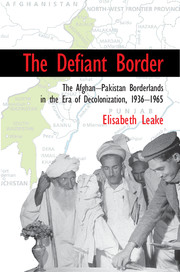Book contents
- Frontmatter
- Contents
- Preface and Acknowledgments
- List of Abbreviations
- Maps
- Introduction: “A Doughty and Honourable Opponent”: Historicizing the Afghan– Pakistan Borderlands
- 1 “Using a Crowbar to Swat Wasps”: The Frontier Tribal Area in Imperial Defense
- 2 The “Opening of Sluice- Gates”: Plan Partition and the Frontier
- 3 “We Are One People and Ours Is a Land”: The Demand for Pashtunistan, 1948–1952
- 4 A “Friendly Point of Return”: Pakistan and the Global Cold War
- 5 An “Eye for an Eye”: Mohammad Ayub Khan and the Collapse of Regional Relations
- Conclusion: “Religion, Land, Lineage and Honour”: The Afghan–Pakistan Borderlands Then and Now
- Index
2 - The “Opening of Sluice- Gates”: Plan Partition and the Frontier
Published online by Cambridge University Press: 20 January 2017
- Frontmatter
- Contents
- Preface and Acknowledgments
- List of Abbreviations
- Maps
- Introduction: “A Doughty and Honourable Opponent”: Historicizing the Afghan– Pakistan Borderlands
- 1 “Using a Crowbar to Swat Wasps”: The Frontier Tribal Area in Imperial Defense
- 2 The “Opening of Sluice- Gates”: Plan Partition and the Frontier
- 3 “We Are One People and Ours Is a Land”: The Demand for Pashtunistan, 1948–1952
- 4 A “Friendly Point of Return”: Pakistan and the Global Cold War
- 5 An “Eye for an Eye”: Mohammad Ayub Khan and the Collapse of Regional Relations
- Conclusion: “Religion, Land, Lineage and Honour”: The Afghan–Pakistan Borderlands Then and Now
- Index
Summary
In September 1946, Jawaharlal Nehru, in his capacity as minister for external affairs, toured the frontier tribal zone, despite the protests of the North-West Frontier Province's (NWFP) governor, Sir Olaf Caroe, who predicted a “serious tribal reaction.” The trip was disastrous: a Muslim League–sponsored protest met Nehru, a major Congress leader, at the Peshawar airport; tribal jirgas in Waziristan and Khyber, suspicious of his intentions, took umbrage at his comments during meetings; Afridi tribal leaders refused altogether to speak with him. At a jirga in Razmak, one tribesman told Nehru, “We do not know about your mission and refuse to be ruled by any outsider as ‘kingdoms changed but the Wazirs’ freedom was unhampered.’ We will talk to Mr. Jinnah if we want to discuss Indian politics.” Upon his return to Delhi, accusations flew back and forth. Nehru decried British support for the existing, “semi-feudal” tribal social structures, while Caroe declared that “These people […] are far too intense to deal with tribesmen.”
Nehru's visit was just one of many indications that circumstances on the frontier – and in the subcontinent more generally – were changing drastically. With the collapse of the Axis war machine in 1945, Great Britain and its empire were left to recover from huge losses. British policy makers could not return to prewar norms after agreements reached with Indian nationalists during the course of the war, and officials soon realized they no longer had the economic resources to maintain their Indian empire. Through a series of tortured debates, discussions, and negotiations, the independent states of Pakistan and India ultimately replaced the Raj.
Throughout postwar discussions, the frontier tribal area remained a source of unease and contention. The postwar committees on frontier defense developed a new governing rationale for the area's Pashtun tribes that retreated from military force; negotiations over Indian independence, however, mooted these discussions. Instead, the future of the region in an independent South Asia became the issue. The same long-standing concerns about the Afghan–Pakistan borderlands’ security remained, but British policy makers had to seek new ways to address them in conjunction with their Pakistani counterparts.
- Type
- Chapter
- Information
- The Defiant BorderThe Afghan-Pakistan Borderlands in the Era of Decolonization, 1936–65, pp. 66 - 103Publisher: Cambridge University PressPrint publication year: 2016



